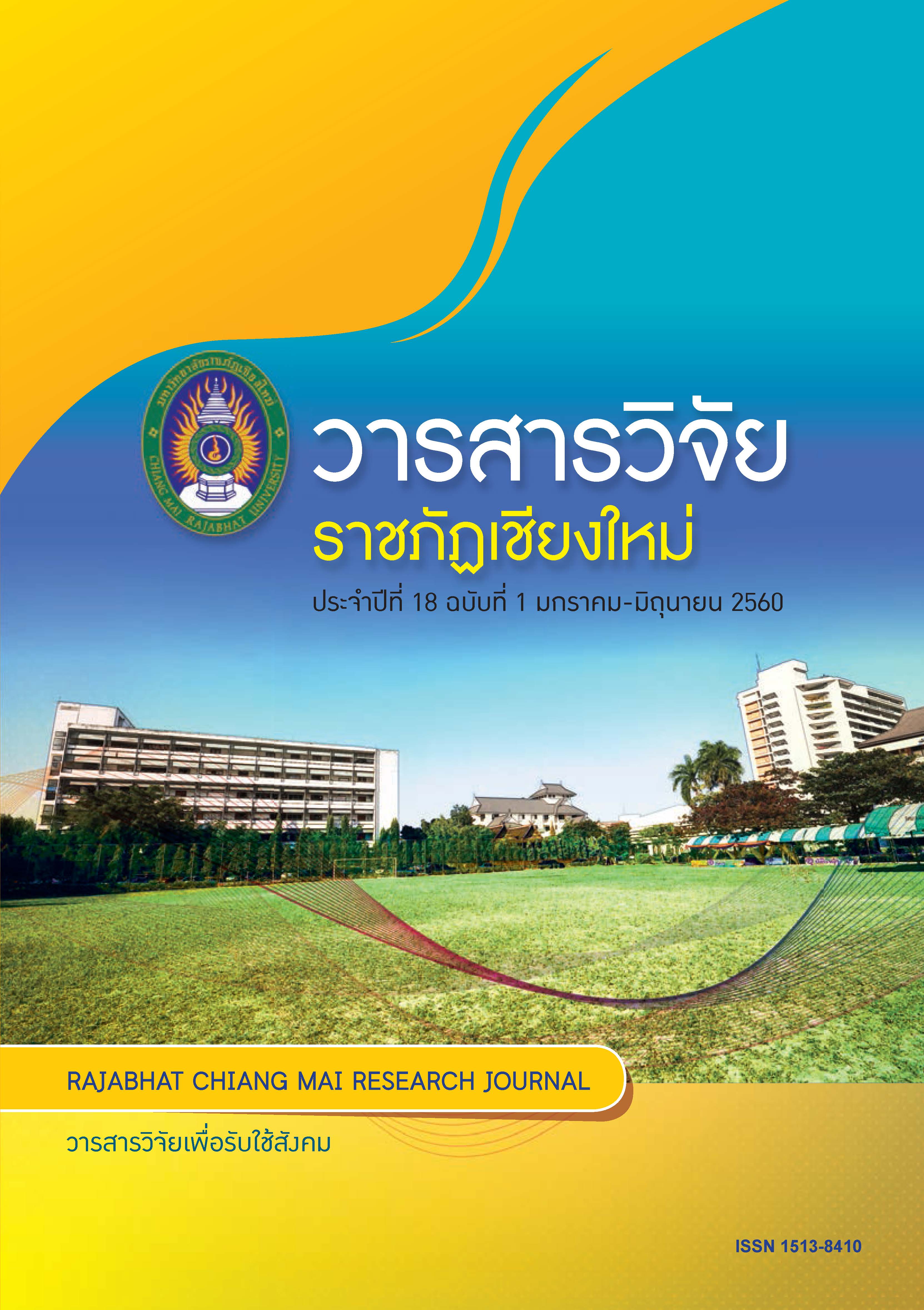Buddhist Principles for spiritual development of female prisoners in Chiang Mai Woman Correctional Institution
DOI:
https://doi.org/10.14456/rcmrj.2017.213867Keywords:
Buddhist principles, Spiritual development, female prisonersAbstract
This research was aimed : 1) to study Buddhist principles for spiritual development of female prisoners, 2) to study the female prisoners’ demand on spiritual development, and 3) to find out guidelines for spiritual development of female prisoners. The simple random method was used to select 297 samples from the population of 1,151 female prisoners. The sample size of this research was calculated by using Taro Yamane formula. The research instruments included : 1) structured interview was conducted to collect data from the Buddhism experts for content analysis, and 2) questionnaire was used to collect data from the female prisoners. The obtained data were analyzed by using frequency distribution, percentage, mean, and standard deviation.
It was found that 1) the Buddhist principles suitable for spiritual development of female prisoners include 5 precepts, 5 ennobling virtues, Moral shame and moral dread, Karmic law, Virtues for a good household life, Patience, Sublime states of mind, Power, Channels to the ruin, Objects of sympathy, Subjects of meditation, Wisdom, and 4 noble truths, 2) Female prisoners said they want to improve their mind and intellectual abilities, control their behaviors and learn about sin, goodness and their circumstances, and 3) guidelines for spiritual development include performing activities in merit-making and practicing perfections, inviting monks or instructors to teach meditation and Buddhist study, providing rooms for meditation practice and adjusting thinking process to realize one’s own value. Results of this research showed that Buddhist principles helps improve mental health of the female prisoners and encourages them to appreciate their own value. It also recommended the Buddhist activities, which could be organized to develop their mind and prevent them from being arrested in the same mistakes.
Downloads
References
ทัณฑสถานหญิงเชียงใหม่. 2557. บทบาท หน้าที่ ภารกิจ. (ระบบออนไลน์). แหล่งข้อมูล: http://www.correct.go.th/fdccham/Chiangmai%20Woman%20Correctional%20Institution/Web%20Chiangmai%20Woman%20Correct/Aboutas.htm (5 กันยายน 2557)
พงศ์ฤทธิ์ จันทรมงคล. 2552. การเปรียบเทียบการเห็นคุณค่าในตนเอง และความเชื่ออำนาจในตนระหว่างผู้ต้องขังที่ปรับตัวได้ดีในทัณฑสถานหญิงเชียงใหม่. วิทยานิพนธ์วิทยาศาสตรมหาบัณฑิต (สาขาวิชาจิตวิทยาการปรึกษา) บัณฑิตวิทยาลัย มหาวิทยาลัยเชียงใหม่.
มหาจุฬาลงกรณราชวิทยาลัย. 2539. พระไตรปิฎกภาษาไทย เล่มที่ 25 ฉบับมหาจุฬาลงกรณราชวิทยาลัย. กรุงเทพฯ: โรงพิมพ์มหาจุฬาลงกรณราชวิทยาลัย.
วัดธรรมกาย. 2530. ศีลคุณค่าความเป็นมนุษย์. ปทุมธานี: วัดธรรมกาย.
วัดเปรมประชา. 2557. เบญจศีล เบญจธรรม. (ระบบออนไลน์). แหล่งข้อมูล: http://watprempracha.com/ (10 กันยายน 2557)
Stress-Free Society. 2557. ชีวิตนี้ มีแต่ความสุข. (ระบบออนไลน์). แหล่งข้อมูล: http://www.meditationguide.org/thai_happiness.pdf (11 ตุลาคม 2558)
Downloads
Published
How to Cite
Issue
Section
License
1. Articles, information, content, images, etc published in the “Community and Social Development Journal” are copyrighted by the Community and Social Development Journal, Chiang Mai Rajabhat University. In order to properly distribute the articles through print and electronic media, the authors still hold the copyright for the published articles under the Creative Commons Attribution (CC BY) license, which allows the re-distribution of the articles in other sources. References must be made to the articles in the journal. The authors are responsible for requesting permission to reproduce copyrighted content from other sources.
2. The content of the articles appearing in the journal is the direct responsibility of the article authors. The editorial board of the journal does not necessarily agree with or share any responsibility.














